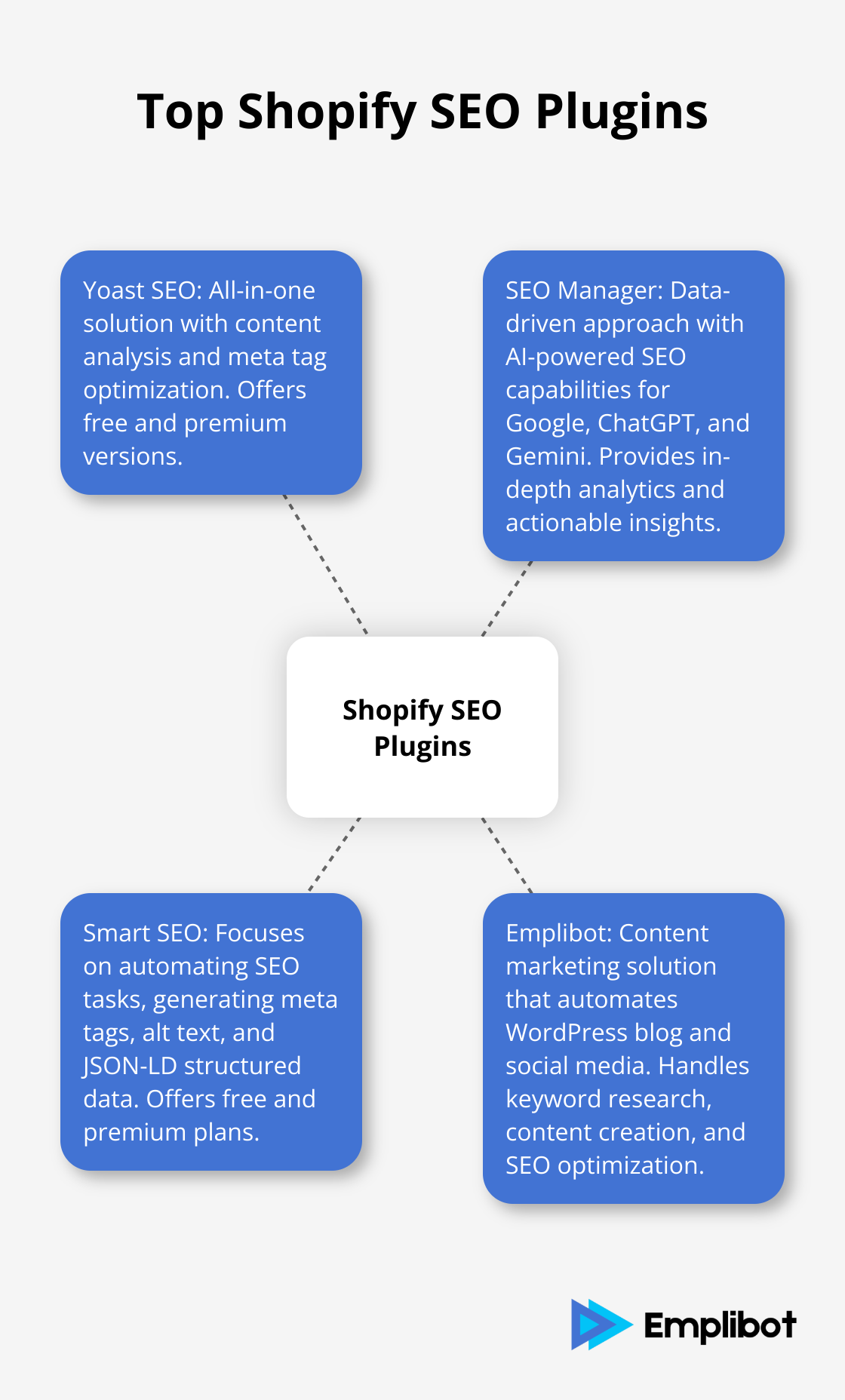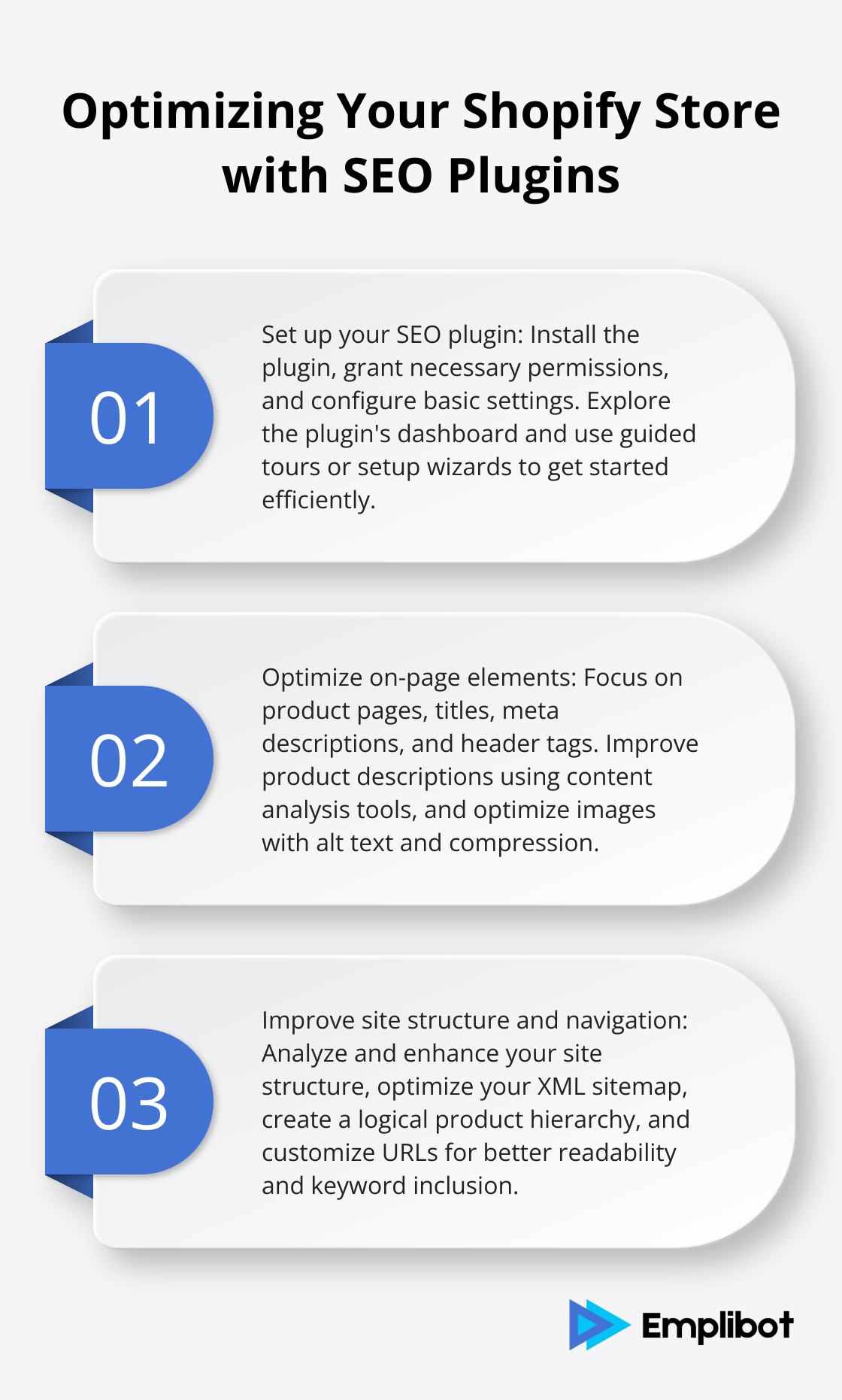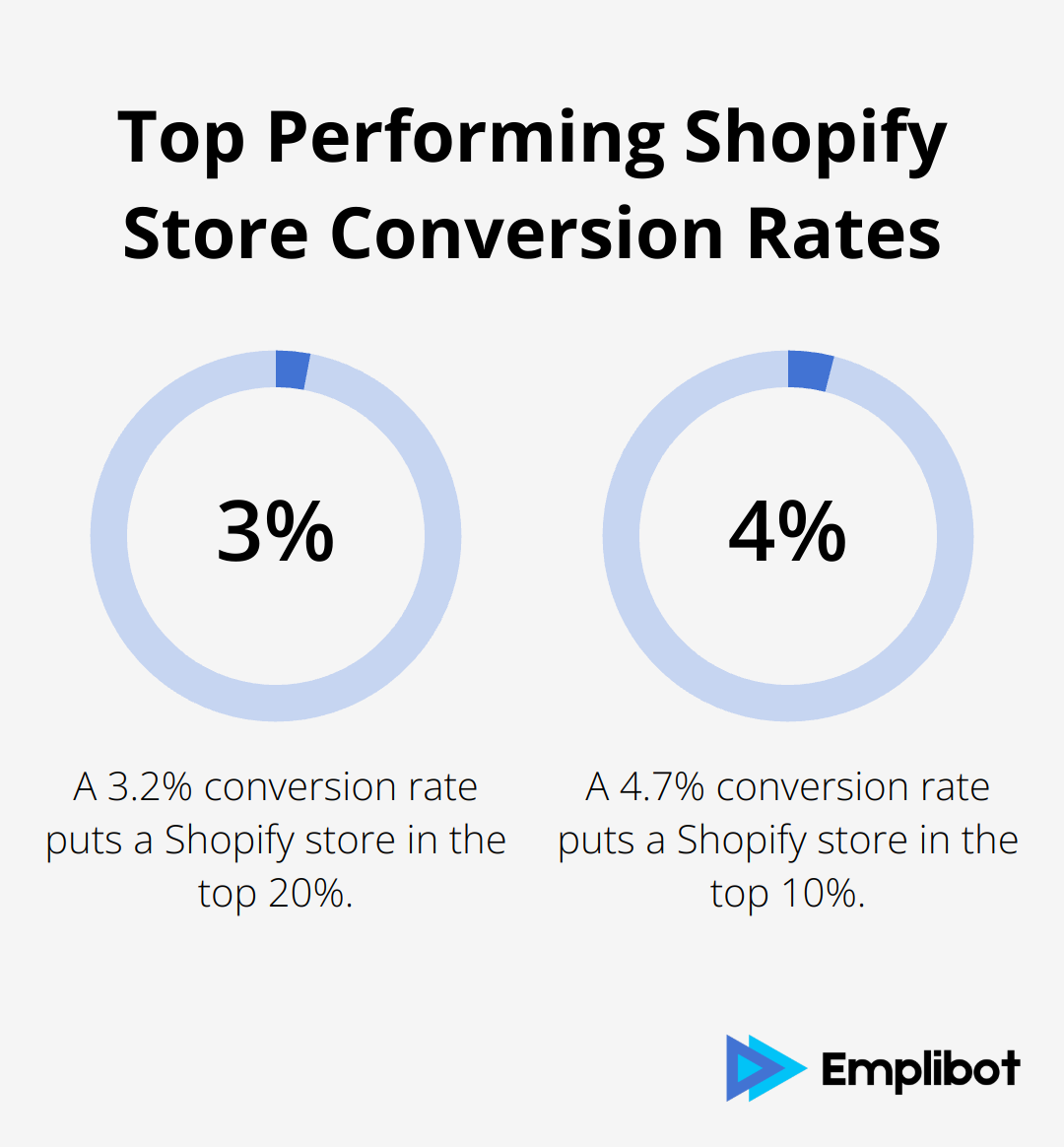At Emplibot, we know that visibility is key for online stores. Shopify merchants often struggle to stand out in search results, missing out on potential customers.
Enter Shopify SEO plugins: powerful tools that can boost your store’s search performance. In this post, we’ll explore the best plugins, how to use them effectively, and how to measure their impact on your store’s success.
Top Shopify SEO Plugins to Boost Your Rankings
Shopify offers a wide range of SEO plugins to help your store climb the search engine rankings. We’ve tested dozens of options and narrowed down the best performers for 2025. Here’s our rundown of the top Shopify SEO plugins that can significantly improve your store’s visibility.

Yoast SEO: The All-in-One Solution
Yoast SEO stands out as a comprehensive solution for Shopify stores. It offers a user-friendly interface and powerful features like content analysis and meta tag optimization. Shopify will automatically generate an XML sitemap based on your site structure, which includes product pages and collections. Yoast’s readability checker ensures your product descriptions are easy to understand, which can improve user engagement and, consequently, your search rankings.
The free version of Yoast provides essential SEO tools, while the premium version unlocks advanced features like internal linking suggestions and redirect management.
SEO Manager: Data-Driven Optimization
SEO Manager takes a data-centric approach to SEO. It provides in-depth analytics and actionable insights to improve your store’s search performance. One standout feature is its AI-powered SEO capabilities for Google, ChatGPT, and Gemini. SEO Manager also helps enhance structured data and automate SEO tasks.
The app offers various plans to suit different needs and budgets. SEO Manager users can expect to boost their Shopify store’s rankings and drive more traffic.
Smart SEO: Automation for Efficiency
Smart SEO focuses on automating SEO tasks, making it an excellent choice for store owners who want to improve their search rankings without diving deep into technical details. It automatically generates meta tags, alt text for images, and JSON-LD structured data, which can significantly improve your chances of appearing in rich snippets.
While Smart SEO offers a free plan with basic features, its premium plan provides advanced automation capabilities and priority support.
Emplibot: The Ultimate Content Marketing Solution
While not specifically an SEO plugin, Emplibot deserves a mention as a powerful tool for content marketing (which plays a significant role in SEO). Emplibot automates your WordPress blog and social media, handling everything from keyword research to content creation and SEO optimization. It produces high-quality, engaging content tailored to your business and distributes it across platforms like LinkedIn, Facebook, and Twitter.
With Emplibot, you can effortlessly increase your traffic, leads, and sales, saving time and resources. It’s perfect for businesses of all types, offering a complete content marketing solution that runs on autopilot or allows for manual control.
As we move forward, it’s important to understand that choosing the right SEO plugin is just the first step. The next crucial phase is learning how to effectively implement and utilize these tools to maximize your store’s search performance. Let’s explore the best practices for optimizing your Shopify store with these powerful SEO plugins.
How to Optimize Your Shopify Store with SEO Plugins
SEO plugins can transform your Shopify store’s search performance. This chapter will guide you through the practical steps to implement and configure these powerful tools effectively.

Setting Up Your SEO Plugin
Most Shopify SEO plugins offer a straightforward installation process. After you add the plugin to your store, you’ll need to grant necessary permissions and configure basic settings. This often includes entering your store’s name, description, and logo. Some plugins may request access to your Google Search Console or Google Analytics accounts for more comprehensive data analysis.
Take time to explore the plugin’s dashboard after initial setup. Many plugins offer guided tours or setup wizards to help you get started. This step can save you time and ensure you use all the tools at your disposal.
Optimizing On-Page Elements
Focus on optimizing key on-page elements with your plugin installed. Start with your product pages, as these are often the most important for e-commerce SEO. Use your plugin’s tools to optimize titles, meta descriptions, and header tags. Try to create titles between 50-60 characters and meta descriptions between 150-160 characters to ensure they display fully in search results.
Next, improve your product descriptions. Many SEO plugins offer content analysis tools that can help you enhance readability and keyword usage. Create unique, detailed descriptions that naturally incorporate relevant keywords. Avoid keyword stuffing – search engines penalize this practice.
Don’t overlook image optimization. Add alt text to all product images using your plugin’s tools. This not only helps with SEO but also improves accessibility for visually impaired users. Compress your images to improve page load times (a critical factor in both SEO and user experience).
Improving Site Structure and Navigation
A well-structured site makes navigation easier for both users and search engines. Use your SEO plugin to analyze your site structure and identify areas for improvement. Many plugins offer tools to create and optimize your site’s XML sitemap, ensuring search engines can easily crawl and index your pages.
Create a logical hierarchy for your products and categories. Use your plugin’s internal linking suggestions to connect related products and improve site navigation. This can increase average order value by guiding customers to complementary products.
Pay attention to your URL structure. Many SEO plugins allow you to customize URLs for better readability and keyword inclusion. Keep URLs short, descriptive, and relevant to the page content.
Leveraging Advanced Features
Many SEO plugins offer advanced features that can give your store an extra edge. These may include:
- Schema markup generators (to help your products appear in rich snippets)
- Keyword research tools (to identify high-value search terms)
- Competitor analysis features (to benchmark your performance against similar stores)
Explore these advanced features and incorporate them into your SEO strategy. They can provide valuable insights and help you stay ahead of the competition.
Monitoring and Adjusting
SEO is an ongoing process that requires regular attention. Set up a schedule to review your plugin’s reports and recommendations. This will help you identify new opportunities for optimization and track your progress over time.
As you implement changes, monitor your store’s performance closely. Look for improvements in key metrics like organic traffic, click-through rates, and search rankings. Be prepared to adjust your strategy based on these results.
The next step in maximizing your Shopify store’s SEO performance is to understand how to measure and interpret the results of your optimization efforts. Let’s explore how to effectively use plugin analytics to track your SEO success.
How to Measure Your SEO Success
Key Performance Indicators for SEO
To gauge the effectiveness of your SEO efforts, focus on these essential metrics:
- Organic Traffic: Monitor the number of visitors coming to your site through search engines. As of 2025, the average eCommerce brand ranks for 1,783 keywords in organic search results, driving an estimated 9,625 organic visitors.
- Keyword Rankings: Track your position in search results for target keywords. Higher rankings often correlate with increased visibility and traffic.
- Click-Through Rate (CTR): This metric shows the percentage of users who click on your search result after seeing it. A higher CTR suggests your meta titles and descriptions compel users to click.
- Bounce Rate: A low bounce rate indicates that visitors find your content relevant and engaging. Try to achieve a bounce rate below 40% for e-commerce sites.
- Conversion Rate: Your SEO efforts should lead to more sales. As of November 2024, an ecommerce conversion rate above 3.2% is considered very good, placing you in the top 20% of Shopify stores. A 4.7% rate puts you in the top 10%.

Interpreting Plugin-Generated Reports
Most SEO plugins provide detailed reports on your store’s performance. Here’s how to make sense of this data:
- Identify Trends: Look for patterns in your metrics over time. Do your rankings consistently improve? Does organic traffic grow month-over-month?
- Spot Quick Wins: Many plugins highlight easy-to-fix issues (like missing meta descriptions or broken links). Addressing these can lead to rapid improvements.
- Analyze Page Performance: Determine which pages drive the most organic traffic and conversions. Replicate successful elements across your site.
- Monitor Competitor Performance: Some plugins offer competitor analysis. Use this data to benchmark your performance and identify areas for improvement.
Integrating SEO Data with Other Analytics Tools
While SEO plugin data provides value, it becomes most powerful when combined with other analytics tools. Here’s how to create a comprehensive view of your SEO performance:
- Google Analytics Integration: Many SEO plugins integrate directly with Google Analytics. This allows you to correlate SEO metrics with broader site performance data.
- Google Search Console: This free tool provides additional insights into your search performance, including impressions and average position for specific queries.
- E-commerce Platform Analytics: Combine SEO data with your Shopify analytics to understand how organic traffic impacts sales and customer behavior.
- Heat Mapping Tools: Tools like Hotjar can show how users interact with your site after arriving from search engines. This can help you optimize your landing pages for better conversions.
Regular analysis of these metrics and reports will enable you to continually refine your SEO strategy. SEO requires an ongoing process of improvement and adaptation to stay ahead of the competition in search rankings.
Final Thoughts
Shopify SEO plugins have become essential tools for store owners who want to boost their online visibility and drive organic traffic. These plugins offer features from automated meta tag generation to comprehensive analytics, which simplify store optimization for search engines. Store owners should choose the right plugin for their needs, configure it properly, and optimize key on-page elements like titles, descriptions, and images.
SEO plugins allow store owners to measure and track their progress effectively. Monitoring key metrics such as organic traffic, keyword rankings, and conversion rates provides valuable insights into optimization efforts. This data helps identify areas for improvement and refine SEO strategies over time (a process that requires patience and consistency).
SEO plugins form just one part of a comprehensive digital marketing strategy. Emplibot offers an all-in-one solution for content creation and distribution to attract more visitors and convert them into customers. With the right Shopify SEO plugin and commitment to ongoing optimization, store owners can improve their search visibility and drive sustainable growth for their business.

